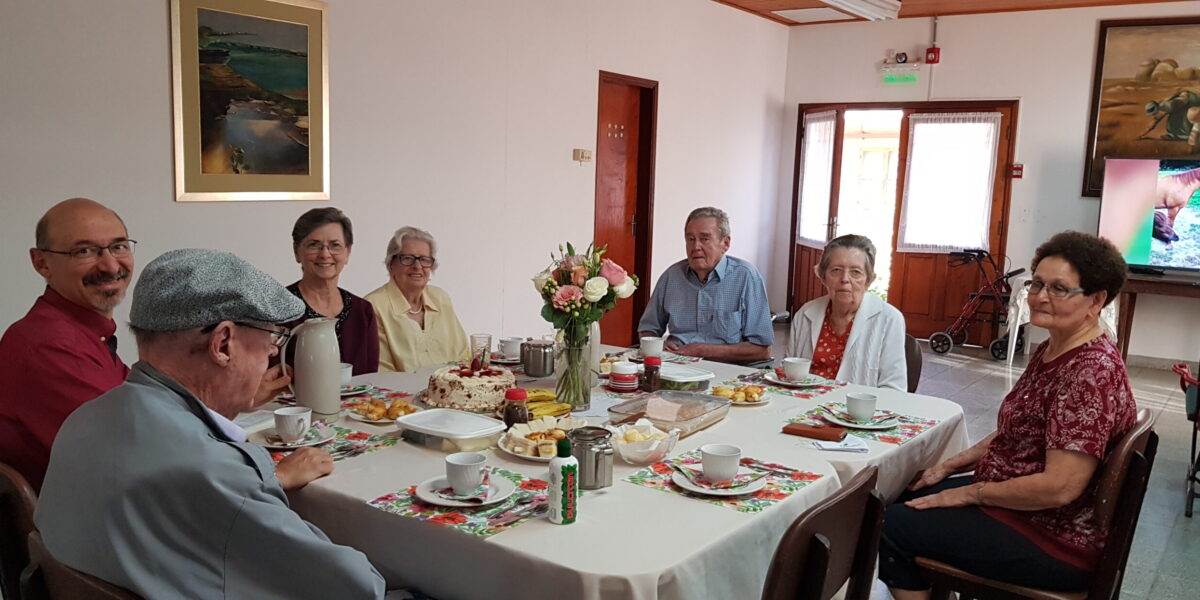Since 1991, Hildi Amstutz has served as a Mennonite Mission Network associate
— along with her husband, C. Paul Amstutz
— in Paraguay. Here is a personal reflection regarding her senior care ministry.
In my senior care ministry, I am discovering this agonizing cry of aging people: "I don’t have any say in anything anymore!"
At the same time, however, I am also learning that aging people can move beyond this cry into a peaceful wisdom, by transitioning from the creation of "to-do" lists to "to-be" lists.
We have the privilege of mentoring young people in the seminary. They are trying to get life
— and themselves
— "under control" and learning how to use control for the benefit of themselves and others. On the other end of life’s spectrum, aging people are learning how to let go of control. Both of those movements have challenges. From a very young age, we are taught to make to-do lists and feel satisfied with each checkmark made on our list. We have accomplished something! As we move into the senior years, we become painfully aware of how life is more about the to-be list,
Doing
comes out of
being
the person we become as we walk with Jesus through the day.

Hildi Amstutz tends her plants as she ponders what it means to make a transition from a "to-do" list to a "to-be" list. She strives to put into practice what shares with others in spiritual retreats and spiritual caregiving with seniors. Photo by C. Paul Amstutz.
Traveling through the Smoky Mountains several years ago, in a little souvenir shop, we came upon a saying that still accompanies us: "People will not remember you by your great accomplishments but by how you made them feel while they were with you."
My mother, Katharina Penner, was a living example of that concept. Her genuine and caring ways attracted people of all ages to enjoy being with her at her life’s end. She lived to be 93. People said of her, "If I have to grow old, I want to grow old the way she did." She was an example of a person who preserved her wit and humor, despite having gone through the rigors of World War II, moving from Russia to Paraguay, and losing five of her seven children. Her famous phrase was, "If life with God is so hard many times, what must life be like without God?" After the many tragedies my parents faced, their summary statement was, "God makes no mistakes."
As a young married woman, I worked as a nursing home aide.
I cared for two elderly women with multiple sclerosis. For the one woman, it seemed as if I couldn’t do anything right, and I often left her room in tears. When leaving the room of the other woman, my spirit would feel refreshed. The smallest deed elicited a sweet: "Thank you! Thank you!" She had learned how to be, despite the fact that her to-do list had ceased to exist years ago. She made good use of the one control she still had —
to choose her attitude.
It is a fact of life: Either you give up control or it will be taken from you. By giving it up, you still can control whom to give it to, be that material possessions or roles in society.
Neither process happens without pain. Though seemingly contradictory, by choosing to let go, we choose the less painful way.
If our values and identity are attached to possessions and positions that can be taken from us, the pain may end in bitterness.
In my journey of aging and walking with aging people, I see the importance of "putting one’s house in order" and how that contributes to more peaceful days and healthier relationships in the extended family. Once again, freeing oneself of the control over material possessions, in an orderly and fair way, helps to contribute to more peaceful relationships within the family.








